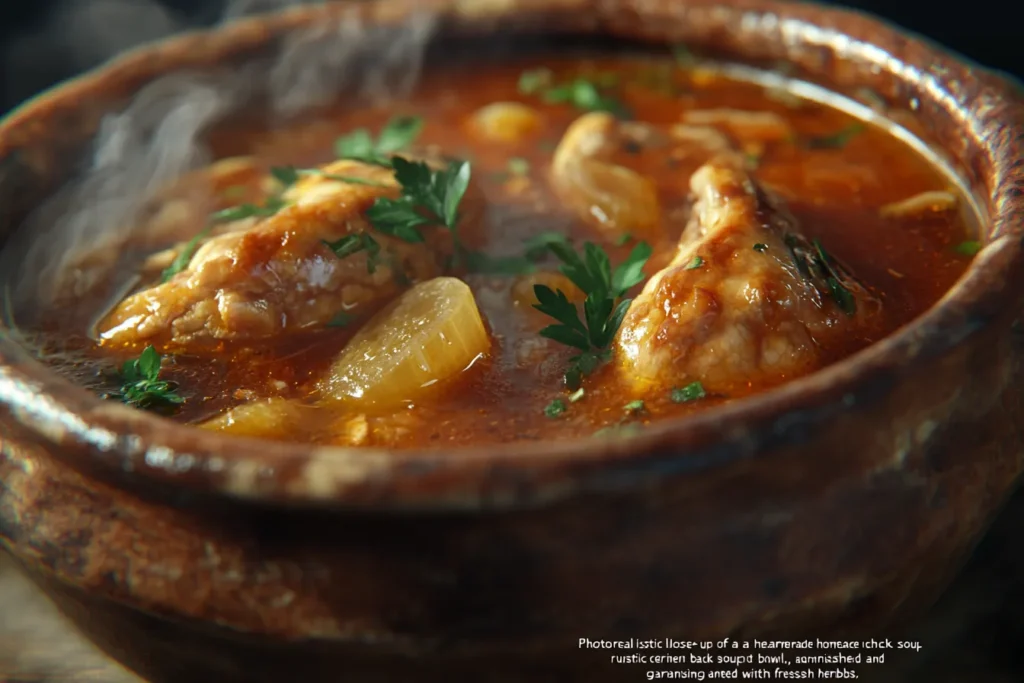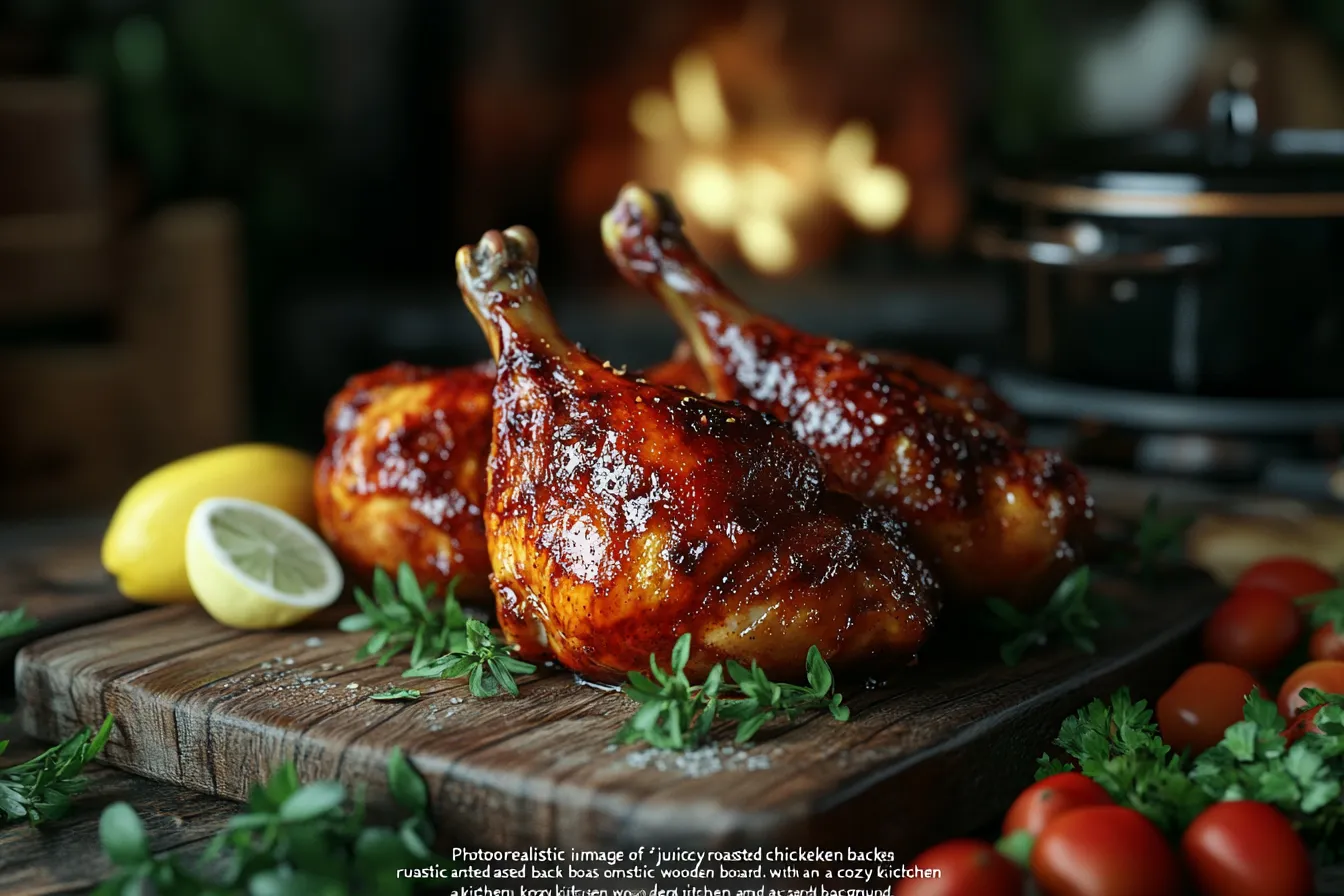Table of Contents
Introduction
Chicken backs? Really? You might be scratching your head right now thinking, “Aren’t those just the throwaway parts?” 🧐 Well, get ready to have your mind blown! These humble, often-overlooked cuts of chicken are bursting with flavor, nutrients, and possibilities.
In fact, chicken backs might just be the unsung heroes of the poultry world. Whether you’re a culinary adventurer looking to spice up your kitchen routine or a health-conscious foodie chasing budget-friendly superfoods, chicken backs deserve a top spot on your plate!
“The best treasures are often hidden in plain sight – and chicken backs are no exception.”
Let’s take a deep dive into why you should stop ignoring chicken backs and start embracing them like a true kitchen rockstar. 🎸🍗
What Are Chicken Backs?
You guessed it: chicken backs come from the back portion of the chicken, including the spine and a little surrounding meat. They usually get removed when butchers cut up whole chickens for parts like breasts, thighs, and wings…Chicken Breast
Anatomy of a Chicken Back
- A typical chicken back includes the vertebrae, some skin, fat, and a small but tasty amount of meat.
- It’s incredibly rich in bone marrow, collagen, and flavor-packed connective tissues.
- Because of this unique combo, chicken backs are perfect for slow-cooked dishes like broths and soups.
Why Are They So Popular?
Chicken backs have been a staple in many cultures for generations, particularly in Asian, African, and Caribbean cuisines.
Why? Because they’re:
- Affordable 💸
- Flavorful
- Highly nutritious
- Perfect for stretching meals
In fact, old-school chefs and grandmas everywhere swear by them for making the richest, most healing chicken broths you’ve ever tasted.
Nutritional Value of Chicken Back
Believe it or not, chicken backs are nutritional powerhouses. They’re not just bones and scraps – they’re packed with essential nutrients your body craves…Royal Chicken
Here’s a quick glance at what you get with a serving:
Table: Nutritional Facts of Chicken Back
| Nutrient | Amount (per 100g) |
|---|---|
| Calories | 210 kcal |
| Protein | 18 g |
| Fat | 16 g |
| Collagen | High |
| Calcium | 8% of Daily Value |
| Iron | 6% of Daily Value |
| Sodium | 70 mg |
Not bad for something people often throw away, huh? 😄

Health Benefits of Eating Chicken Back
Eating chicken backs isn’t just about saving money — it’s about feeding your body with some seriously good stuff.
Packed with Collagen and Gelatin
Collagen and gelatin are like magical elixirs for your skin, hair, nails, and joints.
“Collagen is the glue that holds the body together.”
Chicken backs are packed with these proteins, helping:
- Reduce wrinkles
- Improve skin elasticity
- Strengthen joints and bones
You might just glow after a month of including chicken backs in your diet! ✨
Strengthens Bones and Joints
Since chicken backs are rich in bone marrow and minerals like calcium and phosphorus, they’re excellent for keeping your skeleton strong.
Eating bone-in cuts (or the broth from them) provides:
- Essential minerals your body needs
- Bone density support
- Joint lubrication
Boosts Immune System Naturally
You’ve probably heard of grandma’s chicken soup remedy for colds. 🧓🍵 Well, that healing power largely comes from the nutrients extracted from bones, especially chicken backs!
Chicken backs provide:
- Amino acids like arginine and glutamine that help immunity
- Anti-inflammatory compounds
- Gut-healing properties
Imagine fighting off a cold just by sipping a delicious homemade chicken back soup!
Common Problems With Chicken Back
Even though chicken backs are pretty amazing, they’re not without their little quirks. Let’s tackle the most common issues people face when cooking or eating them.
Are Chicken Backs Too Fatty?
Chicken backs do have a fair amount of fat — but that’s not necessarily a bad thing! Fat adds flavor, keeps the meat moist, and makes for richer broths.
However, if you’re watching your fat intake, here’s what you can do:
- Trim excess fat before cooking.
- Roast or grill instead of frying.
- Skim fat off the top when making soups and stocks.
“A little fat makes life — and food — better, but too much can tip the scale.”
So, it’s all about balance, just like in anything else! ⚖️
Bone Safety Concerns
Bones can be both a blessing and a hazard.
When cooking with chicken backs:
- Simmer longer for broths to fully extract nutrients.
- Be cautious when serving to kids or pets to avoid choking hazards.
- Strain soups if you’re worried about small bone fragments.
For pet owners: Raw bones are generally safer for dogs than cooked ones (but always double-check with your vet!). 🐶
Storage and Freshness Issues
Chicken backs, like any poultry, can spoil quickly if not stored properly. Here’s the lowdown on keeping them fresh:
- Refrigerate immediately after purchase (use within 2 days).
- Freeze if not using right away — they freeze beautifully.
- Label your freezer bags with the date to track freshness.
Quick Tip: Freeze them in meal-sized portions so you can grab just what you need. 🥶

How To Cook Chicken Backs Perfectly
Ready to turn those backs into mouth-watering dishes? Let’s explore the best ways to cook them!
Roasting Chicken Backs
Roasting chicken backs brings out deep, rich flavors. It’s super easy too!
Basic Roasting Steps:
- Preheat oven to 400°F (204°C).
- Toss chicken backs in olive oil, salt, pepper, and your favorite herbs.
- Roast for 30-40 minutes until crispy and golden brown.
Serve them as a snack (yes, seriously!) or break them down to flavor soups and stews.
Making Stock or Broth With Chicken Backs
Chicken backs truly shine when making broth. Here’s a simple recipe:
| Ingredients | Quantity |
|---|---|
| Chicken backs | 2 lbs |
| Carrots | 2 |
| Celery stalks | 2 |
| Onion | 1 large |
| Garlic cloves | 4 |
| Water | 12 cups |
| Bay leaves | 2 |
| Peppercorns | 1 tsp |
Instructions:
- Toss everything in a big pot.
- Bring to a boil, then simmer on low for 6-8 hours.
- Strain and season to taste!
“Good broth resurrects the dead.” – South American Proverb
(Okay, maybe that’s a bit much, but you get the point! 😂)
Grilling for Extra Flavor
If you’ve never grilled chicken backs before, you’re missing out! 🔥
- Marinate backs in a mixture of olive oil, lemon, garlic, and spices.
- Grill over medium heat, turning occasionally until nicely charred and cooked through (about 20 minutes).
- Serve with a dipping sauce for a crunchy, savory treat.
Pro Tip: The bones help insulate the meat, keeping it juicy even on high heat!
Delicious Recipes Using Chicken Back
Now let’s get down to the fun part — cooking some killer meals with chicken backs! 👨🍳🍗
Classic Chicken Back Soup Recipe
This is comfort food at its best — hearty, warming, and crazy simple.
Ingredients:
- 1 lb chicken backs
- 1 onion, chopped
- 2 carrots, diced
- 2 celery stalks, chopped
- 4 cups chicken broth
- 1 cup noodles or rice
- Salt, pepper, thyme to taste
Directions:
- Sauté onion, carrots, and celery until soft.
- Add chicken backs and broth.
- Simmer 45 minutes.
- Add noodles or rice and cook another 10 minutes.
Sprinkle with parsley and serve hot! 🌿
Crispy Baked Chicken Backs
Want a snack that’ll beat potato chips any day? Try crispy baked chicken backs.
Instructions:
- Dry chicken backs thoroughly.
- Coat in seasoned flour.
- Bake at 425°F for 25-30 minutes until golden and crunchy.
Perfect with ranch or hot sauce! 🔥
Where To Buy Chicken Backs
Alright, you’re sold — now where the heck do you buy these magical chicken backs?
Best Stores and Online Shops
- Local butcher shops often sell them cheap.
- Asian and ethnic markets are gold mines for affordable cuts.
- Online meat suppliers (like Crowd Cow, Porter Road) offer high-quality options delivered to your door.
What To Look For When Buying
- Fresh smell: No funky odors.
- Pale pink color: No grayish tones.
- Firm texture: Avoid slimy pieces.
Buying organic or free-range backs? Even better!
FAQs About Chicken Back
Let’s tackle those lingering questions you might have!
Are Chicken Backs Good for Dogs?
Absolutely! Raw chicken backs (never cooked!) are packed with:
- Calcium
- Phosphorus
- Essential fats
Always supervise, though — and consult your vet first!
Can I Eat the Bones?
You can eat softened bones from slow-cooked or pressure-cooked chicken backs. They’re loaded with minerals!
Hard, sharp bones? No bueno. ❌ Always use caution.
How Long Do Chicken Backs Last in the Freezer?
Properly sealed, chicken backs can last up to 6 months in the freezer. Use vacuum-sealing for best results.
Conclusion: The Comeback of Chicken Backs
Chicken backs are the ultimate underdog story. 🎉 From overlooked scraps to nutrient-rich, flavor-packed superstars, they deserve a spot in your kitchen!..Guide to Chick-fil-A
So next time you’re browsing the meat section or chatting with your butcher, remember: the back is where it’s at!
“Great things often come from humble beginnings – and chicken backs are no different.”
Give them a try — your taste buds (and your wallet) will thank you!

Chicken Back Soup
Ingredients
Equipment
Method
- Heat a splash of oil in a large pot over medium heat.
- Add the onion, carrots, and celery. Sauté until softened, about 5 minutes.
- Add the chicken backs, garlic, bay leaf, and thyme. Stir briefly.
- Pour in the chicken broth and bring to a boil.
- Reduce heat and simmer for about 45 minutes.
- (Optional) Add noodles or rice and cook an additional 10 minutes until tender.
- Remove chicken backs, shred off any meat, and return meat to the pot.
- Season with salt and pepper to taste.
- Serve hot, sprinkled with fresh parsley!
